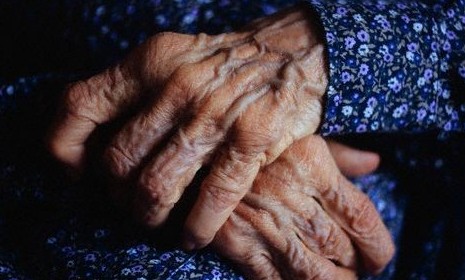A new genetic test: Will you live to be 100?
A new study shows that certain genes explain why some people live to 100 or more, even if they don't lead "model" healthy lifestyles — and a test is now available to the public

A free daily email with the biggest news stories of the day – and the best features from TheWeek.com
You are now subscribed
Your newsletter sign-up was successful
Doctors still can't guarantee their patients long life, but a Boston University study published in the journal Science offers new insight into why some people stay healthy past 100. Here's what the study revealed about the secret to living an extra-long life, and how a new test will be able to predict your odds with a high degree of accuracy:
What appears to be the secret to living past 100?
It's mostly in your genes. The researchers looked at the genomes of 1,000 centenarians, and found about 150 genetic markers that set them apart from the general population. And the more of these "gene signatures" people possess, says Dr. Tom Pearls, a lead author of the study, the longer they were likely to live past the age of 100.
The Week
Escape your echo chamber. Get the facts behind the news, plus analysis from multiple perspectives.

Sign up for The Week's Free Newsletters
From our morning news briefing to a weekly Good News Newsletter, get the best of The Week delivered directly to your inbox.
From our morning news briefing to a weekly Good News Newsletter, get the best of The Week delivered directly to your inbox.
How important are other factors?
The key combinations of genetic markers appeared in 77 out of 100 centenarians in one study sampling. The other 23 percent may be able to chalk up their longevity to exceptionally healthy lifestyles or old-age genes that remain unidentified, the authors of the study say. And inheriting longevity from both parents appears to be like hitting "the jackpot," says geriatrics expert Bradley Willcox. It proved the case with some of the oldest people in the study pool.
So do the super-old have perfect genes?
No. Scientists are still working on pinpointing the hereditary sources of longevity by comparing the gene sequences of healthy people over 80 with those of people who died of age-related illnesses before age 80. But researchers already know that centenarians share some genes associated with earlier deaths. "A great many people carry the genes that cause heart attack, cancer and other diseases, but some have modifier genes that cancel out their risk," says Eric Topol, director of Scripps Genomic Medicine. "We believe they actually have an inborn protection from aging."
A free daily email with the biggest news stories of the day – and the best features from TheWeek.com
How can young people figure out if they'll live to 100?
It's pointless to ask centenarians for the secret to long life. There's little evidence of "an abstemious lifestyle" among the 450 people between the ages of 95 and 110 enrolled in the Longevity Genes Project at Albert Einstein College of Medicine. But, thanks to the study, there's now a test to see if you have the genes that make people predisposed to longevity. It's available for free through the New England Centenarian Study — but takers must have their complete genomic data, which can cost thousands of dollars.
Sources: Wall St. Journal (2), Toronto Star
-
 6 of the world’s most accessible destinations
6 of the world’s most accessible destinationsThe Week Recommends Experience all of Berlin, Singapore and Sydney
-
 How the FCC’s ‘equal time’ rule works
How the FCC’s ‘equal time’ rule worksIn the Spotlight The law is at the heart of the Colbert-CBS conflict
-
 What is the endgame in the DHS shutdown?
What is the endgame in the DHS shutdown?Today’s Big Question Democrats want to rein in ICE’s immigration crackdown